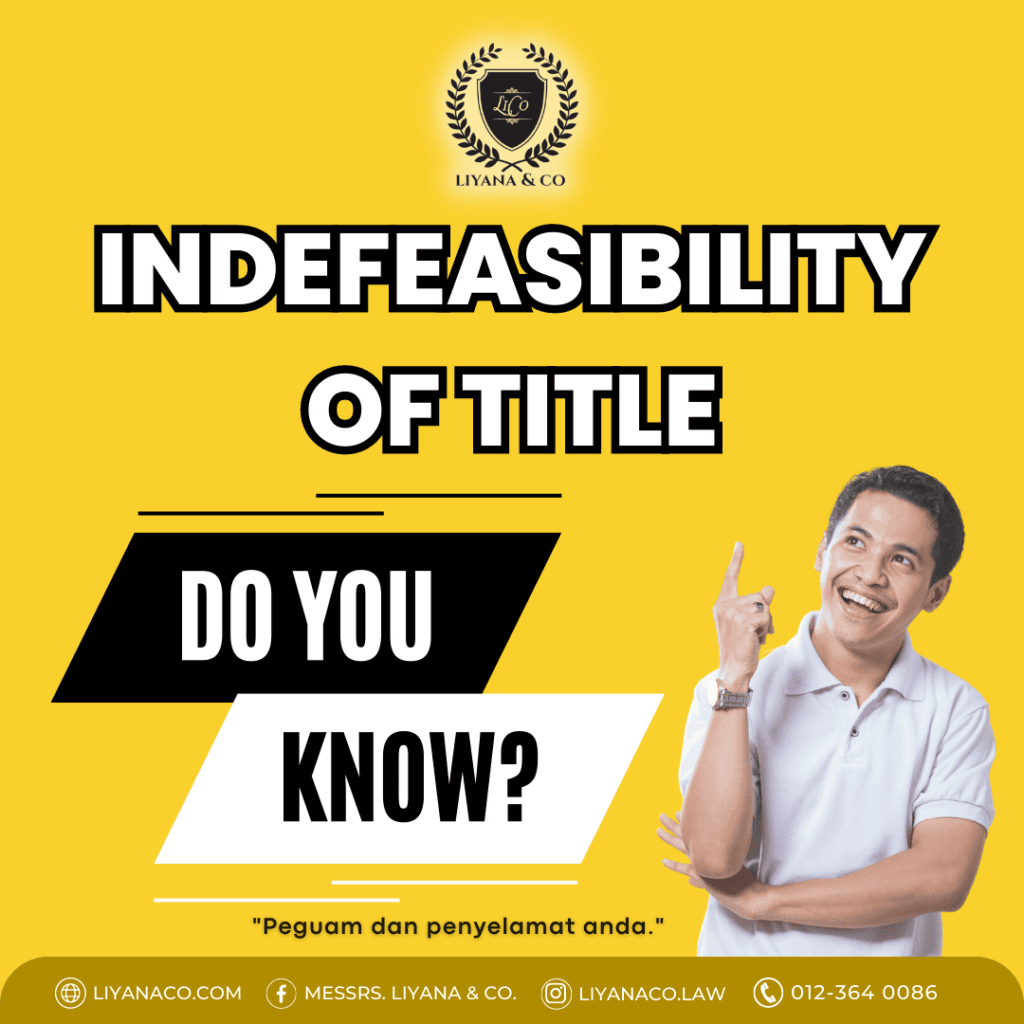
This week we will share about indefeasibility of title.
Originally, it was taken from the concept of the Torrens System to settle property matters which were later adopted by the British a long time ago.
The Torrens system is a registration-based system for each property for which registration is everything.
In short, the law protects any registered property owner as each such registered title cannot be denied by any party.
EXAMPLES OF SITUATIONS
Situation A:
Ali owns a piece of land in Kedah. He gave permission to his cousin Azlan, and his family family to live on the land. After Azlan died, Azlan’s children claimed the land.
Situation B:
Siti is the registered owner of a property where there are shop lots. Her friend Hana, had deceived Siti and transferred the property on her name. Realising this, Siti demanded her property back.
In situation A, Ali is the registered owner of the land so his ownership is conclusive and final.
In case B, since Hana’s action was fraudulent, Siti has the right to claim her property.
In conclusion, Ali and Siti as registered owners that will be protected by the legal principle of indefeasibility of title of their property.
SECTION 340(1) OF THE NATIONAL LAND CODE
“(1) The title or interest of any person or body for the time being registered as proprietor of any land, or in whose name any lease, charge or easement is for the time being registered, shall, subject to the following provisions of this section, be indefeasible”
Section 340(1) gives legal meaning that any person or body who owns a registered title or interest in a property, their ownership shall be indefeasible.
Registration of ownership in the grant will be conclusive evidence of ownership of a property. This is because, in the Torrens System, registration is everything.
SECTION 340(1) OF THE NATIONAL LAND CODE
This provision states about exceptions to the principle of indefeasibility of title:
“(2) The title or interest of any such person or body shall not be indefeasible:
(a) in any case of fraud or misrepresentation to which the person
or body, or any agent of the person or body, was a party or privy; or
(b) where registration was obtained by forgery, or by means of an insufficient or void instrument; or
(c) where the title or interest was unlawfully acquired by the person or body in the purported exercise of any power or authority conferred by any written law.”
In short, if a party wants to deny ownership of the property, he must prove the above matter (a), (b), (c) to the court.
If it can be proved, such ownership will be denied.
NISHA V FARHAN & ANOR [2018] 6 MLJ 826
Nisha made a claim against Farhan in respect of a property. Nisha’s mother has purchased the property from a developer who is also the respondent in this case.
Nisha’s mother later died. The developer transferred the property to one of the Nisha siblings, which is Farhana’ father through a deed of assignment.
Nisha alleged Farhana deceived the developer to transfer the property to Farhana’s late father by using a forged deed of assignment.
After Farhana’ father died, Farhana’s family live on the property. So Nisha claims the property.
High Court and the Court of Appeal rejected Nisha’s claim. The transfer form 14A and deed of assignment are valid and there is no element of fraud.
CHOON & LAIN LWN KENG & LAIN-LAIN [2020] 6 MLJ 525
Choon, the First Appellant and the Third Appellant is a sibling. Their late mother owns a property. The property was transferred to both of them and Choon’s wife, the Second Appellant, through a deed of gift. The title has been registered since 2007.
Keng which is the First Respondent is Choon’s uncle. Keng has occupied since 1983 and built a building on the property without permission. Keng makes an animal farming business. He then rents out to another person, the Second and Third Respondents in this case.
In this Appeal case, the court allows the appeal of the Appellants as they are indeed registered co-owners of the property which has been perfectly registered since 2007.